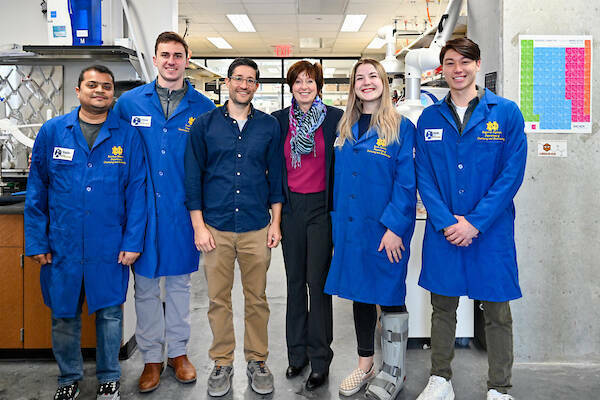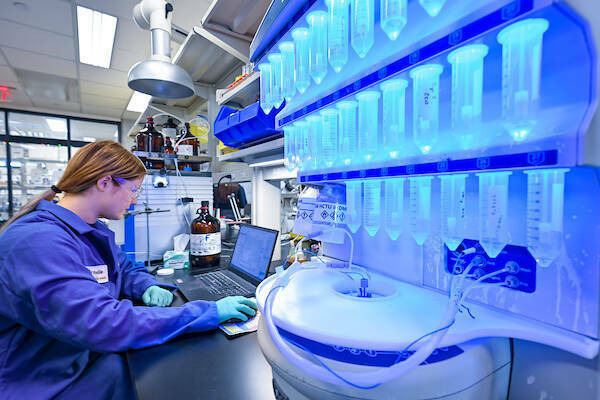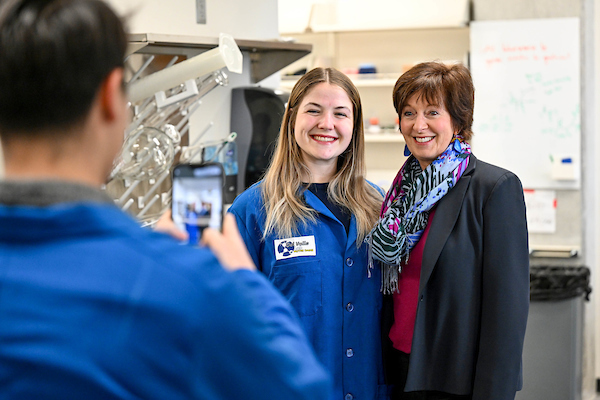As the NCAA 2023 Pat Summitt Award honoree, legendary Notre Dame women’s basketball coach Muffet McGraw received the privilege of designating a $10,000 honorarium toward any organization researching or combatting neurodegenerative diseases; she chose Juan Del Valle’s lab at the University of Notre Dame.

Del Valle, William K. Warren Family Associate Professor in the Department of Chemistry and Biochemistry, researches small and large molecules with the long-term goal of developing disease-modifying drugs and therapies to slow the progression of neurodegenerative diseases—Alzheimer’s, corticobasal degeneration, and frontotemporal dementia, for example.
This lab is the perfect fit according to McGraw, who wanted to fund Alzheimer’s-specific research in honor of Summitt, the award’s namesake and Naismith Memorial Basketball Hall of Fame Tennessee Lady Vols basketball coach who died from early-onset Alzheimer’s in 2016.
McGraw, herself a Naismith Memorial Basketball Hall of Famer, also desired to fund research specifically at Notre Dame, an on-campus search that led her to the work of Del Valle. “I was so impressed with him, and he’s such a star in this field,” she said.
Del Valle’s field explores the creation of molecules from scratch—molecules designed to address a protein called tau, which is known to be a driver of a growing list of nearly 40 neurodegenerative diseases that are collectively termed tauopathies. When tau proteins misfold, they build up toxic fibers in the brain. The toxic buildup leads to neurodegenerative diseases with the symptoms depending on the location of the tau tangles in the brain.
Del Valle and “Team Tau,” a group of four Notre Dame graduate researchers and one postdoctoral researcher, are working to create molecules that bind to misfolded tau proteins and temper their propagation, and therefore hinder the toxic fiber buildup.

“We dream up molecules, literally,” Del Valle said. “Then we design them, almost like molecular-level engineers, and then we test to see if our designs actually do what we think they’ll do.
“The coolest thing about organic chemistry is that you can make molecules the universe hasn’t ever seen before.”
This chemistry research takes place in McCourtney Hall, the first interdisciplinary research building dedicated to collaborative research at the crossroads of science and engineering located on the east side of campus. It’s also where McGraw presented a $10,000 check to the researchers to advance their work.
“We’re thrilled that [McGraw] thought of keeping this funding here at Notre Dame,” he said, noting that federal agencies tend to be conservative toward “high risk” research projects like his own. Getting these extraordinary ideas off the ground could result in therapies for people facing the devastating pain of neurodegenerative disease—people like one of McGraw’s best friends who is currently navigating the difficult realities of her own diagnosis.
“It’s really heartbreaking for her,” McGraw reflected. “It’s also heartbreaking for the people around her.” Her friend’s personal battle adds to the weightiness of honoring Summitt’s legacy through this funding from the NCAA.
“We need so much more research,” she said. “Because everybody’s touched by this. Everybody knows somebody that’s going through this.”
As Del Valle is dreaming up molecules in his lab, McGraw dreams of research ultimately leading to a cure for Alzheimer’s and other neurodegenerative diseases.
It’s playing the long game.
“Science moves a bit slowly; a little slower than basketball,” she laughed. Research requires patience, something she doesn’t believe she has, but it’s why she appreciates the meticulous research of the scientific community that could impact and improve the world.
“Maybe something will come out of here [Del Valle’s lab], and we’ll be the ones leading the charge.”

Leading the charge is something Summitt did throughout her trailblazing and unparalleled career, and McGraw deeply admires the late coach’s exemplary leadership. “She was an incredible legend, just an icon in women’s basketball. Everybody wanted to emulate her.
“We were 0-20 against Tennessee my first twenty games, and then we beat them to go to the Final Four, and I could not believe how classy she was after the game,” McGraw reminisced, sharing how Summitt had just begun to experience the effects of her Alzheimer’s diagnosis at the time of that 2011 Irish victory in the NCAA March Madness Tournament.
McGraw described Summitt as “the lone voice” who used her platform to advocate for women in their game at the time. It’s a voice McGraw carries on today, even when it comes to science.
“We’d love to see more women over here in the labs,” she said. It matters to McGraw that we champion women in science, engineering, and other fields that have typically been male-dominated. Two of Del Valle’s Team Tau researchers are women—a personal bonus point for her selection of this particular lab, as she admires the value Del Valle places on diversity and inclusion in his work.
Funding more research. Receiving an award with Pat Summitt’s name. It’s all a humbling honor for McGraw, but her ultimate hope is for a positive impact on the next generation. “I think we all look at our kids, and we say we want the world to be better when they’re older, and [an Alzheimer’s cure is] not going to be here in time for my generation, but the next generation—that’s what we’re hoping for.”